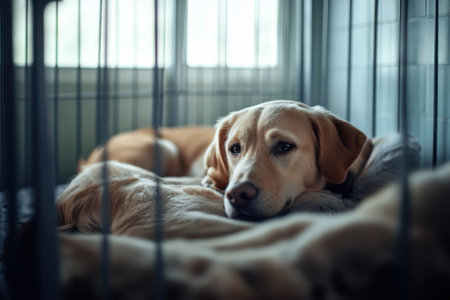Understanding Senior Dogs
When we talk about “senior dogs,” it’s important to remember that age is more than just a number—it’s about how our furry companions experience the world as they grow older. In the United States, most veterinarians and pet owners consider dogs to be seniors somewhere between 7 and 10 years old, depending on their breed and size. For example, larger breeds like Golden Retrievers or Great Danes often reach their golden years a bit earlier, sometimes as soon as age six, while smaller breeds like Chihuahuas or Miniature Poodles may not be considered seniors until closer to ten. Knowing when your pup becomes a senior matters because aging brings changes that affect everything from energy levels to sleeping habits. Understanding this stage of life helps us support our dogs with extra love, comfort, and care—especially when it comes to making sure they get the rest they need to stay happy and healthy in their later years.
Changes in Sleep Patterns With Age
As our beloved dogs enter their golden years, it’s only natural to notice changes in their sleep habits. Senior pups often experience shifts that can be both subtle and significant. Where once they might have slept soundly through the night, older dogs may now wake up more frequently or seem restless. Napping during the day also becomes more common, sometimes with your senior dog curling up for several short snoozes instead of one long stretch. These changes are just part of aging, and understanding them can help you provide the best care possible for your furry friend.
Typical Sleep Changes in Senior Dogs
| Sleep Habit | Younger Dogs | Senior Dogs |
|---|---|---|
| Nighttime Sleep | Long, uninterrupted | More frequent waking, restlessness |
| Daytime Naps | Short, infrequent | Multiple, longer naps |
| Total Hours Slept Per Day | 12-14 hours | 14-18 hours (sometimes more) |
| Sleep Quality | Deep and restorative | Lighter, easily disturbed |
These changes stem from a variety of factors, including decreased physical activity, aches and pains from arthritis or other age-related conditions, and shifts in metabolism. Just like us humans might find ourselves dozing off in a rocking chair on a lazy afternoon, senior dogs appreciate those extra moments of rest scattered throughout the day.

3. Common Sleep Issues in Senior Dogs
As our beloved canine companions grow older, their sleep patterns often begin to shift, sometimes causing concern for pet parents. It’s not unusual to notice your senior dog experiencing a range of sleep disturbances that weren’t present in their younger days. Recognizing these issues early is key to keeping your furry friend comfortable and happy during their golden years.
Restlessness at Night
One of the most common sleep problems among aging dogs is restlessness during nighttime hours. You might see your old pup pacing around the house, getting up and down repeatedly, or struggling to settle in their favorite bed. This kind of fidgety behavior could be due to joint pain, cognitive changes, or even just difficulty finding a comfortable position—much like our own creaky knees and backs as we age!
Insomnia or Difficulty Falling Asleep
Insomnia isn’t just a human problem; senior dogs can have trouble falling or staying asleep too. They may appear tired but seem unable to drift off into a deep, restful slumber. Sometimes this happens because of underlying health concerns such as arthritis, dental pain, or chronic illnesses that disrupt their comfort and relaxation at night.
Nighttime Wandering
If you notice your elderly dog wandering the house at odd hours—perhaps bumping into furniture or seeming confused—they could be experiencing symptoms related to canine cognitive dysfunction (similar to dementia in people). Nighttime wandering can also signal anxiety, vision loss, or an increased need to relieve themselves overnight due to kidney changes or other medical conditions.
What These Signs Might Mean
While occasional restless nights can be normal, persistent changes in your senior dog’s sleep habits often point to discomfort or health challenges that deserve attention. These behaviors are not simply “old dog quirks”; they are important clues that something may need addressing—whether it’s managing pain, supporting brain health, or adjusting daily routines. If you observe these signs regularly, it’s wise to chat with your veterinarian so you can work together to make bedtime peaceful for everyone in the family—two-legged and four-legged alike!
4. Health Conditions Impacting Sleep
As our beloved dogs enter their golden years, it’s common for various health issues to crop up—many of which can disrupt their sleep. Just like us, senior pups often face age-related conditions that make it harder to rest comfortably through the night. Understanding these problems is the first step to helping your furry friend get better shut-eye.
Common Age-Related Health Problems
| Condition | How It Affects Sleep | What You Might Notice |
|---|---|---|
| Arthritis & Joint Pain | Makes lying down and getting up uncomfortable, leading to restless nights. | Limping, reluctance to move, frequent shifting positions while sleeping. |
| Cognitive Dysfunction (Doggy Dementia) | Disrupts normal sleep-wake cycles; causes confusion and nighttime wandering. | Pacing at night, barking, seeming disoriented or anxious after dark. |
| Incontinence | Frequent need to urinate or accidents can wake your dog—and you—up several times. | Waking up wet, increased trips outside, restlessness before bed. |
| Vision & Hearing Loss | Sensory changes can make nighttime more stressful and confusing. | Bumping into things, startling easily when approached, increased vocalization at night. |
| Heart Disease & Respiratory Issues | Trouble breathing comfortably may lead to insomnia or waking often. | Coughing, labored breathing, seeking cool or elevated spots to rest. |
How These Conditions Disrupt Sleep
Older dogs with arthritis might toss and turn because they just can’t find a comfy spot. Dogs experiencing cognitive decline could become confused about the time of day, staying awake at night and napping all afternoon. Even something as simple as needing more bathroom breaks can add up to a lot less restful sleep for both you and your pup. If you notice any of these signs, it’s always a good idea to talk with your vet—they may recommend treatments or lifestyle tweaks that can help your senior dog feel more comfortable and sleep soundly again.
5. Creating a Senior-Friendly Sleep Environment
Just like us, senior dogs need a cozy and supportive space to rest their aging bodies. Making a few thoughtful changes around your home can work wonders for your old pup’s nightly slumber. Start by investing in an orthopedic dog bed—these beds are designed to cushion achy joints, ease pressure points, and provide extra support that regular beds just can’t match. Place the bed in a quiet, draft-free corner away from heavy foot traffic so your senior dog feels safe and secure.
Consider Accessibility
If your dog has trouble getting around, make sure their favorite sleeping spots are easily accessible. Place non-slip rugs or mats along slick hardwood floors to prevent slips and falls during late-night wanderings. If your dog used to sleep on the couch or your bed but can no longer jump up safely, consider sturdy pet stairs or ramps so they can reach their preferred perch without strain.
Nighttime Potty Breaks
Aging pups often need more frequent potty breaks, even in the middle of the night. Try setting a gentle alarm for a quick outdoor trip before bedtime and once during the night if needed. Keep a leash, flashlight, and poop bags handy by the door for easy access on those sleepy trips outside.
Soothing Sounds and Lighting
Some senior dogs sleep better with soft background noise like calming music or white noise machines. Nightlights placed in hallways or near their bed can help older dogs with vision issues navigate safely in the dark.
By making these small but meaningful changes, you’ll help your golden oldie settle down comfortably each night—because every senior dog deserves sweet dreams and restful nights.
6. When to Seek Veterinary Help
As our beloved senior dogs settle into their golden years, it’s natural for their sleep patterns to shift. However, not every change is simply a part of aging—sometimes, disturbed or excessive sleep can signal something more serious. Knowing when to reach out to your vet can make all the difference in keeping your furry friend happy and healthy.
Spotting Concerning Changes
While it’s normal for older pups to snooze more, be on the lookout for sudden changes. If your senior dog becomes unusually restless at night, has trouble settling down, wakes up frequently whining or panting, or starts sleeping far more—or less—than usual, it could indicate an underlying issue. Other red flags include difficulty getting comfortable, pacing, or vocalizing during sleep.
Common Health Issues Linked to Sleep Changes
Certain medical conditions become more common as dogs age and may disrupt their sleep. These include arthritis (leading to pain and discomfort), cognitive dysfunction syndrome (doggy dementia), heart disease, diabetes, thyroid imbalances, and urinary tract problems that cause frequent nighttime potty breaks. If you notice signs like limping, confusion, accidents indoors, increased drinking or urination, coughing, or shortness of breath along with sleep changes, don’t ignore them.
When It’s Time to Call the Vet
If you’re ever unsure whether your dog’s sleep habits are normal for their age or if something seems off, trust your instincts—pet parents know their pups best! Schedule a veterinary visit if you observe:
- Sudden or dramatic shifts in sleep patterns
- Lethargy that doesn’t go away with rest
- Painful movements or reluctance to get up
- Confusion or disorientation at night
- New behaviors such as pacing or vocalizing during sleep
Your vet can run tests to rule out medical problems and offer advice tailored to your dog’s needs. Early intervention often leads to better outcomes and helps ensure your senior companion enjoys many more cozy naps by your side.


